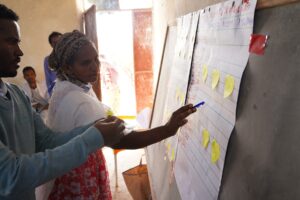As the end of 2020 draws near, it goes without saying that this year presented several challenges for countries, international organizations, private sector and the vulnerable communities and people experiencing multiple, compound shocks.
The Covid-19 pandemic was an unprecedented test of governments’ abilities to manage risks, which are continuing to be stretched by compounding climate-related disasters and economic crises. Now, more than ever, the need for disaster risk finance and insurance solutions is clear – humanitarian assistance and government response budgets cannot provide enough assistance to meet the swelling demand.
The World Food Programme (WFP) has continued to help vulnerable communities and governments to manage climate risks to ensure they are not overwhelmed by climate extremes that are occurring concurrently with other regional and global crises. While the Covid-19 pandemic presented a number of challenges for implementation, WFP worked swiftly to adjust its climate risk financing programmes. In particular, WFP developed new processes for the distribution of insurance products, adapted the design of the conditionality mechanisms for accessing the products, and ensured appropriate public health measures when disbursing payouts.

Farmers identify bad rainfall years in an interactive exercise in Ethiopia. WFP/Michael Goode
WFP’s Climate Risk Insurance Coverage Continued Expansion in 2020
Despite the challenges faced by many in 2020, WFP continued to make progress on realizing its vision of expanding the R4 Rural Resilience Initiative to insure a total of 500,000 faming households by 2022. There were a number of successes this year as the initiative scaled up into three new countries (Bangladesh, Mozambique and Madagascar), new products developed to meet the needs of smallholder farmers as well as pastoralists and the groundwork laid for expansion into the Latin American and Caribbean region in 2021. WFP continued expansion in 2020 of its flagship macroinsurance programme, ARC Replica, ensuring that people experiencing extreme drought on top of the impacts of Covid-19 still received life-saving assistance. Below is a breakdown of the number of people protected through insurance accessed through WFP’s climate risk financing programmes:
| Country | No. of People benefiting from Microinsurance† | No. of People benefiting from Macroinsurance |
| Bangladesh | 10,000 | Ø |
| Burkina Faso | 167002,500 | 110,000 |
| Ethiopia | 335,000 farmers
77,500 pastoralists |
Ø |
| The Gambia | Ø | 41,000 |
| Kenya | 61,000 | Ø |
| Madagascar | 17,500* | Ø |
| Malawi | 350,000* | Ø |
| Mali | Ø | 744,780 |
| Mauritania | Ø | 107,500 |
| Mozambique | 13,000* | Ø |
| Senegal | 44,900 | (not covered by WFP) |
| Zambia | 39,250 farmers
25,000 livestock policies |
Ø |
| Zimbabwe | 30,000* | 269,500 |
| TOTALS | 1,013,150 | 1,272,780 |
* Denotes projected policy coverage numbers as enrollment is ongoing
† WFP provides microinsurance policies to individual households, estimating an average household size of 5 people
WFP’s Other Key Achievements in 2020
WFP also achieved key milestones during 2020 that will support the organization with providing the appropriate tools and products for effective climate risk management. Specifically, these include:
- WFP launched its first insurance product protecting households from catastrophic flooding in Bangladesh. The scheme has paid out in its first year, with participants receiving approximately 30 USD through the B-cash mobile banking platform.
- ARC Replica had payouts triggered from 2019/20 policies in Mauritania and Zimbabwe – providing early assistance to 4000 people in Mauritania and 40,000 people in Zimbabwe through WFP purchased policies.
- WFP’s Senegal Country Office initiated implementation of WFP’s first Green Climate Fund project. The project will scale-up access to microinsurance for 45,000 vulnerable farming households.
- WFP has continued to develop its portfolio of livestock insurance products, with the Satellite Index Insurance for Pastoralists in Ethiopia (SIIPE) programme providing 15,500 pastoralist households with index-based livestock insurance and the Zambia Country Office introduced livestock insurance for 5,000 households.
- WFP’s Regional Office in Latin America and the Caribbean established a Risk Financing Strategy to encourage the adoption of innovative, responsible, sustainable and scalable risk financing tools to build resilience for the most vulnerable and food insecure. Inspired by this regional strategy, Guatemala is adopting a layered approach where the complementarity between microinsurance, forecast-based financing (FbF), and macro and meso risk financing tools is at the core. Other countries such as Dominica, Cuba, Dominican Republic, Haiti and El Salvador are currently exploring the pathways to integrate risk financing tools within their programmes.
